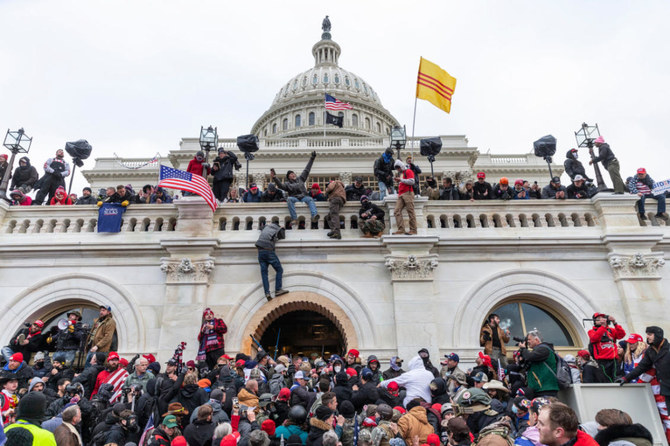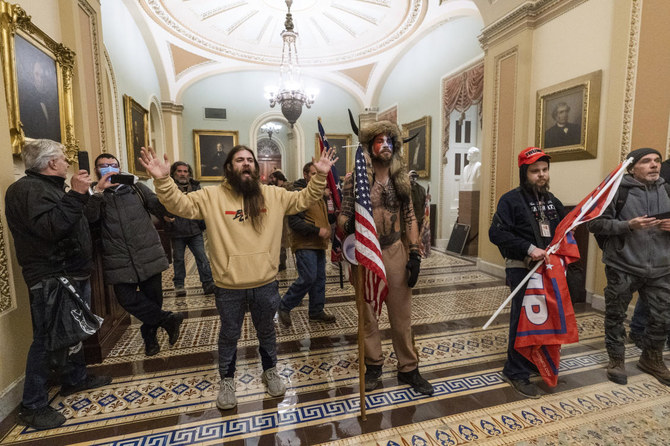NEW YORK: Oh, how things have changed.
Just a year ago, many Republicans joined Democrats in reacting with horror to the Capitol insurrection, denouncing both the violence perpetrated by the rioters and the role played by former President Donald Trump in stoking the outrage that fueled their actions with lies about a “stolen” election.
But on the anniversary of the attack, top Republicans were far more muted. Some acknowledged the terror of the day but quickly pivoted to bashing Democrats. Many avoided observances planned at the Capitol. And still others didn’t say anything at all.
It’s all part of the political calculus in a party in which the former president remains very much in charge.
Missing in action
The party’s top congressional leaders were missing from Thursday’s commemoration events at the Capitol. House Minority Leader Kevin McCarthy did not make an appearance or issue a statement. Republican Senate leader Mitch McConnell, who delivered one of the sharpest denunciations of Trump after the attack, was in Atlanta for the funeral of former Sen. Johnny Isakson.
Indeed, during a moment of silence held in honor of law enforcement officers, only two Republicans were present in the House chamber: Rep. Liz Cheney of Wyoming, who has become a pariah in her party over her criticism of Trump’s actions, and her father, former Vice President Dick Cheney.
In a statement, McConnell called Jan. 6 “a dark day for Congress and our country” after “the seat of the first branch of our federal government was stormed by criminals who brutalized police officers and used force to try to stop Congress from doing its job.”
But he also criticized Democrats for what he said was their politicization of the attack. “It has been stunning to see some Washington Democrats try to exploit this anniversary to advance partisan policy goals that long predated this event,” he said.
It was a notable shift from the comments he had made last year after the Senate voted against Trump’s impeachment.
“There’s no question — none — that President Trump is practically and morally responsible for provoking the events of the day. No question about it,” he said then, calling it “a disgraceful, disgraceful dereliction of duty.”

Pro-Trump supporters rioted and breached the Capitol on Jan. 6, 2021. (Shutterstock)
Then and now
Like McConnell, Republican Sen. Lindsey Graham, a friend and ally of the former president, was clear in his denunciation of Trump immediately following the Jan. 6 attack.
“All I can say is count me out. Enough is enough,” he’d said then.
On Thursday, however, Graham, who remains close to Trump, marked the occasion with a mix of shock and partisan attacks.
“I still cannot believe that a mob was able to take over the United States Capitol during such a pivotal moment — certifying a presidential election. It would have been so easy for terrorists to boot strap onto this protest and wreak even further destruction on the US Capitol,” he wrote.
Still, he pivoted to politics, characterizing the speeches by President Joe Biden and Vice President Kamala Harris at the Capitol as an “effort to resurrect a failed presidency more than marking the anniversary of a dark day in American history.”
“Their brazen attempts to use January 6 to support radical election reform and changing the rules of the Senate to accomplish this goal will not succeed,” he wrote.
Politics first
Florida Gov. Ron DeSantis, considered a potential 2024 presidential candidate, was also quick to pounce. Speaking to reporters in Florida on Thursday morning around the same time Biden was addressing the nation, DeSantis slammed Democrats and the media for making so much hay of the event.
“This is their Christmas, January 6th,” he said. “They are going to take this and milk this for anything they could to try to be able to smear anyone who ever supported Donald Trump.”
He lashed out at those who have compared the gravity of what happened on Jan. 6 to the Sept. 11, 2001, terror attacks and said most Florida residents have other issues on their minds.
“I think it’s going to end up being just a politicized Charlie Foxtrot today,” he said, using military slang for a chaotic situation. “I think it’s going to be nauseating, quite frankly.”
No comment
Other potential 2024 candidates, meanwhile, stayed conspicuously silent, underscoring the complicated calculus they face in a party in which Trump remains very much in charge, with the support of wide swaths of the primary-voting electorate.
Former Vice President Mike Pence — who fled for his life on Jan. 6 as rioters broke into the Capitol, chanting “Hang Mike Pence!” — did not not release a statement marking the occasion.
Pence has said that he and the former president will likely never “see eye to eye” on the events of Jan. 6 and has defended his role that day in rejecting Trump’s demands that he overturn the election results — something he did not have the power to do. At the same time, he has accused the media of reporting on the attack to “demean” Trump’s supporters and to “distract from the Biden administration’s failed agenda,” as he said on Fox News in October.

Jake Angeli, wearing fur hat with horns, and other supporters of former US President Donald Trump, leading rioters at the US Capitol on Jan. 6, 2021. (AP file photo)
Also saying nothing were former Secretary of State Mike Pompeo, who has been laying the groundwork for a possible 2024 campaign by highlighting the Trump administration’s successes, and former Ambassador to the United Nations Nikki Haley, who found herself on the wrong side of the party’s base when she criticized Trump immediately after the insurrection. She has since said that she will not run for the GOP nomination if Trump chooses to move forward with the comeback campaign he’s been teasing.
Counterprogramming
While Trump canceled the anniversary news conference he’d been planning in Florida for Thursday, several of his most ardent followers scheduled their own counterprogramming.
“We’re ashamed of nothing,” said GOP Rep. Matt Gaetz of Florida during an appearance with Georgia Rep. Marjorie Taylor Greene on a podcast hosted by former Trump strategist Steve Bannon, who has been indicted for defying a subpoena from the House committee investigating the insurrection. “We’re proud of the work that we did on Jan. 6 to make legitimate arguments about election integrity.”
Greene slammed Republican Sen. Ted Cruz of Texas, another potential 2024 contender, for having characterized the anniversary as an event marking “a violent terrorist attack on the Capitol.”
She accused Cruz of disrespecting “MAGA patriots” and “people that rioted at the Capitol and did breach the Capitol.”
“Shame on Ted Cruz,” she said.
Party of Trump
The GOP’s transformation into the Party of Trump came perhaps most clearly into focus as former Vice President Dick Cheney paid an unexpected visit to the Capitol to support his daughter, who has become one of the most prominent anti-Trump voices.
Asked what he made of Republican leadership’s handling of the anniversary, Cheney, who served under George W. Bush, was glib in his assessment of an institution that has all but been remade in Trump’s image.
“It’s not a leadership that resembles any of the folks I knew when I was here for 10 years, dramatically,” Cheney, also a former congressman, told reporters.
“The importance of January 6th as a historic event cannot be overstated,” he added in a statement. “I am deeply disappointed at the failure of many members of my party to recognize the grave nature of the January 6 attacks and the ongoing threat to our nation.”
Karl Rove, who served as deputy chief of staff in the Bush administration and advised Trump at points during the 2020 campaign, wrote an op-ed in the Wall Street Journal addressing those in his own party “who for a year have excused the actions of the rioters who stormed the Capitol, disrupted Congress as it received the Electoral College’s results, and violently attempted to overturn the election.”
“There can be no soft-pedaling what happened and no absolution for those who planned, encouraged and aided the attempt to overthrow our democracy. Love of country demands nothing less. That’s true patriotism,” he wrote.













